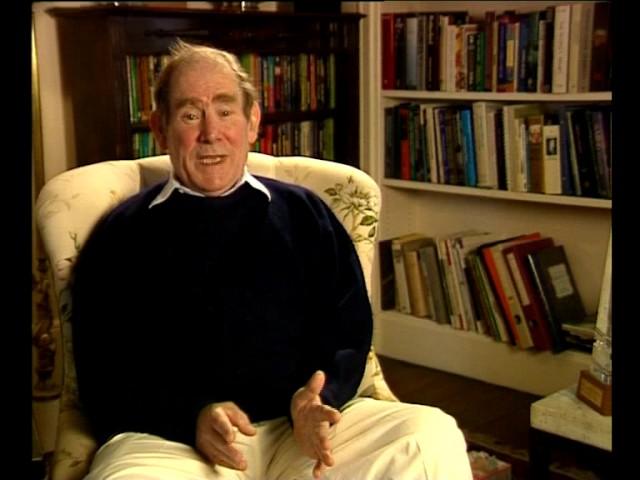
Sydney Brenner - The next important problem: development and differentiation (126/236)
To hear more of Sydney Brenner’s stories, go to the playlist: https://www.youtube.com/watch?v=Zf13v0OEdt8&list=PLVV0r6CmEsFyxf1sRqxZgh-06WFw4zgPj
South African Sydney Brenner (1927-2019), who jointly discovered messenger RNA, was a pioneer in the field of genetics and molecular biology. He was one of three co-recipients of the 2002 Nobel Prize in Physiology or Medicine. [Listener: Lewis Wolpert; date recorded: 1994]
TRANSCRIPT: Being interested in… in higher cells, one had to be interested not only the functions of more complex systems but also the... the big problem, which was development. And of course everybody there knew that differentiation – that is, how cells came to be different from each other, ostensibly carrying the same genetic information in a higher organism – that differentiation was the next… the next important problem. The grand paper of Jacob and Monod really gave you a means for seeing this. That is, you could get cells separate simply by turning off certain genes and turning on certain genes. In fact, Gunther Stent wrote an article saying that as far as he was concerned embryology or development was a solved problem, it wasn't interesting, for the simple reason that Jacob and Monod have already told us what to do. But as in all parts of biology the more general the theory the more vacuous it is. So that if you simply say development's just a matter of turning the right genes on in the right place at the right time and that's the answer, that's absolutely true but it's absolutely useless, because somewhere deep down in our cells what we'd like to do is to actually go and make a mouse, to build a mouse. Of course no one'll build a real mouse, but we'd like to be able to make a gedanken mouse. And so using those… that approach just became clear that one would have to do things in detail before one was satisfied, because the meanings of the genes in higher organisms are exactly so, such that they know how to compute the final mouse, and therefore you could say the total or the final explanation of everything is to be able to compute animals from DNA sequences alone. If you can get that, then we have an explanation of everything. And I've always used that as my criterion, and of course I've been severely criticised for saying that because everything anybody knows it's… says it's impossible. I should have added into that description: that is, DNA sequences plus some initial conditions which good physicists would always include. And of course it's in the definition of the initial conditions, that's the important thing. But as we know from our understanding of Schrödinger's mistake, that the initial conditions are also specified in the DNA. And you could take a view of this that the best program to find out about anything that's biological is get hold of all the genes, find out what they do and find out how they got that way. And in fact at that time I… when many people were still concerned whether biology was consistent with physics, I came to the conclusion that of course it was consistent with physics. If it wasn't, we wouldn't be here. So that problem was answered. The other problem was what is the nature of a biologist's work? That's not the question he has to ask, he doesn't ask those questions. The only questions he asks are threefold, which is: how does it get built? How does it work? And how does it get that way? So those are the questions of development –in the broadest sense, of physiology, although the physiological question is asked first, and of evolution. And of course the latter I think's the most interesting of all of these, but still we have to work through the two first. And since all of this is written in some sense in the genes, that makes genetics the master science of biology. In fact it's the only science and all the others are just ways of getting to understand what the genes do. And I say that simply because that's what evolution must change, that's the material that evolution has to work for. And that's what we finally have to try to understand at the end of the day, or year, or century, or whenever it is.
South African Sydney Brenner (1927-2019), who jointly discovered messenger RNA, was a pioneer in the field of genetics and molecular biology. He was one of three co-recipients of the 2002 Nobel Prize in Physiology or Medicine. [Listener: Lewis Wolpert; date recorded: 1994]
TRANSCRIPT: Being interested in… in higher cells, one had to be interested not only the functions of more complex systems but also the... the big problem, which was development. And of course everybody there knew that differentiation – that is, how cells came to be different from each other, ostensibly carrying the same genetic information in a higher organism – that differentiation was the next… the next important problem. The grand paper of Jacob and Monod really gave you a means for seeing this. That is, you could get cells separate simply by turning off certain genes and turning on certain genes. In fact, Gunther Stent wrote an article saying that as far as he was concerned embryology or development was a solved problem, it wasn't interesting, for the simple reason that Jacob and Monod have already told us what to do. But as in all parts of biology the more general the theory the more vacuous it is. So that if you simply say development's just a matter of turning the right genes on in the right place at the right time and that's the answer, that's absolutely true but it's absolutely useless, because somewhere deep down in our cells what we'd like to do is to actually go and make a mouse, to build a mouse. Of course no one'll build a real mouse, but we'd like to be able to make a gedanken mouse. And so using those… that approach just became clear that one would have to do things in detail before one was satisfied, because the meanings of the genes in higher organisms are exactly so, such that they know how to compute the final mouse, and therefore you could say the total or the final explanation of everything is to be able to compute animals from DNA sequences alone. If you can get that, then we have an explanation of everything. And I've always used that as my criterion, and of course I've been severely criticised for saying that because everything anybody knows it's… says it's impossible. I should have added into that description: that is, DNA sequences plus some initial conditions which good physicists would always include. And of course it's in the definition of the initial conditions, that's the important thing. But as we know from our understanding of Schrödinger's mistake, that the initial conditions are also specified in the DNA. And you could take a view of this that the best program to find out about anything that's biological is get hold of all the genes, find out what they do and find out how they got that way. And in fact at that time I… when many people were still concerned whether biology was consistent with physics, I came to the conclusion that of course it was consistent with physics. If it wasn't, we wouldn't be here. So that problem was answered. The other problem was what is the nature of a biologist's work? That's not the question he has to ask, he doesn't ask those questions. The only questions he asks are threefold, which is: how does it get built? How does it work? And how does it get that way? So those are the questions of development –in the broadest sense, of physiology, although the physiological question is asked first, and of evolution. And of course the latter I think's the most interesting of all of these, but still we have to work through the two first. And since all of this is written in some sense in the genes, that makes genetics the master science of biology. In fact it's the only science and all the others are just ways of getting to understand what the genes do. And I say that simply because that's what evolution must change, that's the material that evolution has to work for. And that's what we finally have to try to understand at the end of the day, or year, or century, or whenever it is.
Тэги:
#Sydney_Brenner #genetics #molecular_biology #messenger_RNA #mRNA #genes #Human_Genome_Project #Nobel_Prize_in_Physiology_or_Medicine #Web_of_Stories #yt:stretch=4:3 #Erwin_Schrödinger #Gunther_Stent #Jacques_Monod #François_JacobКомментарии:
Sydney Brenner - The next important problem: development and differentiation (126/236)
Web of Stories - Life Stories of Remarkable People
It Auditor : Careers Uncovered
RoleCatcher
India Rickshaw Challenge and Backpacking Trip 2023
Do Your Dream! :)
Wall Stencil Painting #shorts
Om painting works
RadioShack Pro-82 VHF/UHF Handheld Radio Scanner
stereophonicstuff


























